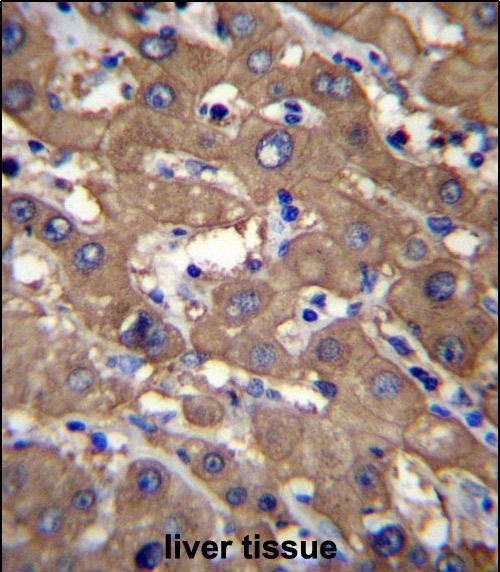

| WB | 1/1000 | Human,Mouse,Rat |
| IF | 咨询技术 | Human,Mouse,Rat |
| IHC | 1/100-1/500 | Human,Mouse,Rat |
| ICC | 技术咨询 | Human,Mouse,Rat |
| FCM | 咨询技术 | Human,Mouse,Rat |
| Elisa | 咨询技术 | Human,Mouse,Rat |
| Aliases | UDP-glucose 6-dehydrogenase, UDP-Glc dehydrogenase, UDP-GlcDH, UDPGDH, UGDH |
| Entrez GeneID | 7358 |
| WB Predicted band size | 55.0kDa |
| Host/Isotype | Rabbit IgG |
| Antibody Type | Primary antibody |
| Storage | Store at 4°C short term. Aliquot and store at -20°C long term. Avoid freeze/thaw cycles. |
| Species Reactivity | Human |
| Immunogen | This UGDH antibody is generated from rabbits immunized with a KLH conjugated synthetic peptide between 465-494 amino acids from the C-terminal region of human UGDH. |
| Formulation | Purified antibody in PBS with 0.05% sodium azide. |
+ +
UGDH (UDP-glucose 6-dehydrogenase) is a key metabolic enzyme that catalyzes the NAD+-dependent conversion of UDP-glucose to UDP-glucuronic acid, a critical precursor for synthesizing glycosaminoglycans (GAGs) like hyaluronic acid, heparan sulfate, and chondroitin sulfate. These GAGs are essential components of the extracellular matrix, influencing cell adhesion, signaling, and tissue structure. UGDH also plays roles in detoxification processes by supporting glucuronidation, a phase II metabolic reaction. Dysregulation of UGDH has been implicated in pathological conditions, including cancer progression, fibrosis, and metabolic disorders, where altered GAG production or cellular redox balance contributes to disease mechanisms.
UGDH antibodies are widely used tools to study the enzyme's expression, localization, and function in biological systems. They enable detection of UGDH in techniques such as Western blotting, immunohistochemistry, and immunofluorescence. High-quality UGDH antibodies are critical for distinguishing between active and inactive enzyme forms, particularly given post-translational modifications that regulate its activity. Research using these antibodies has revealed tissue-specific expression patterns and upregulated UGDH levels in certain tumors, correlating with enhanced invasiveness and poor prognosis. Additionally, UGDH antibodies aid in exploring its interaction partners and regulatory pathways, providing insights into its role in cellular metabolism and disease pathogenesis. Validation of antibody specificity remains crucial due to potential cross-reactivity with structurally similar dehydrogenases.
×